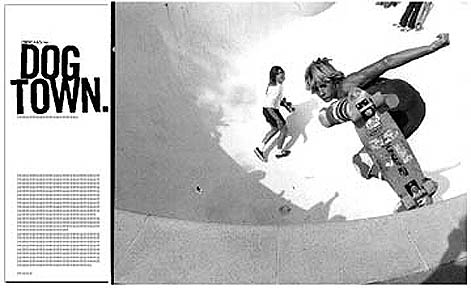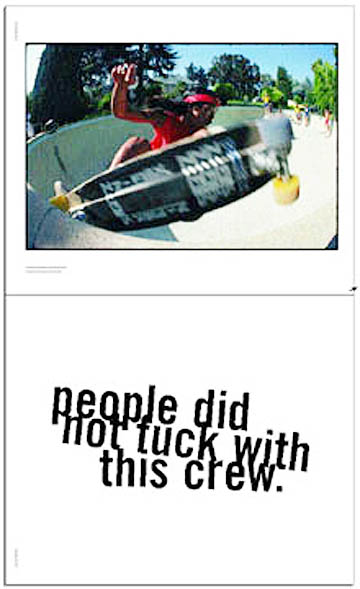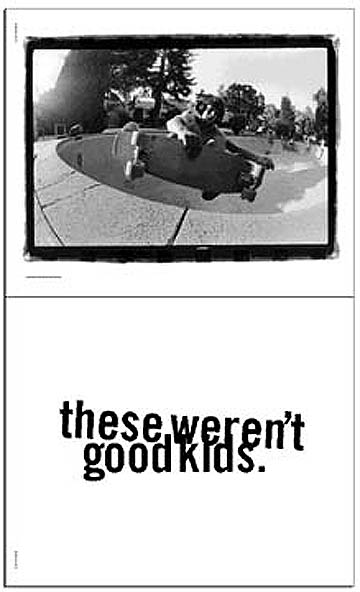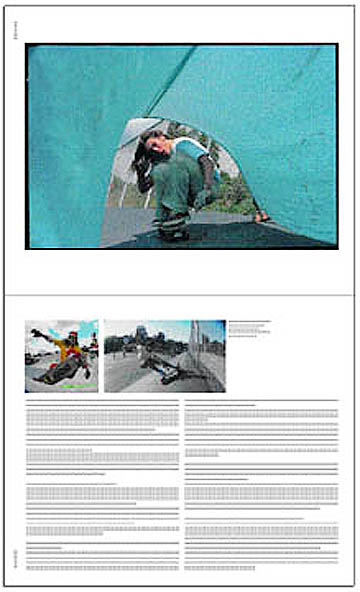the
FADER.
NUMBER 7 - SPRING 2001
PHOTO ARCHIVE
DOGTOWN
story Sonny Nguvu photography Glen E. Friedman

Around the time that NASA launched its Skylab program to prove humans could live and work in space for extended periods of time, a ragtag collection of Southern Californians were equally intent on slipping the surly bonds of Earth. It was the mid-'70's, and they began as wild-out surfers in love with riding rudely fashioned homemade skateboards atop newly invented polyurethane wheels. White, brown, yellow, black, they represented DogTown: a burnt-out netherworld wedged between Santa Monica and Venice; in their early incarnation they were know as Z-Boys - so named for the Zephyr Productions Surf Shop that provided them with Identity and refuge. their attitude was Fuck Off And Die.That meant you.
The Small wheels of history aided the rapid evolution from shredding the paved hills of canyon playgrounds to the advent of vert, as in vertical. In the mid '70s a drought left hundreds of Los Angeles area private swimming pools bone dry...
And then one day... air. Somebody, maybe Jay Adams or Tony Alva or Stacy Peralta, rolled on polyurethane dreams through the belly of some absentee fat cat's pool, gathered speed, shot up the side of the bowl, hit the edge... and kept going. Somebody saw a little daylight then and there - A sliver of space or infinity or even mortality maybe - before he turned the nose of the board around and sailed down into the belly of the beast again. Skateboarding changed right then, at that moment, for better and for worse, and the lives of it's pioneers show the verve of those changes.

Photojournalist Glen E. Friedman cut his teeth in DogTown, both as a skater and as a 12-year-old kid with a camera in his hand. Following the lead of pioneering gonzojourno Craig Stecyk's ground zero reportage in SkateBoardermagazine, at 14 Friedman began to record and publish visual records of the DogTown skate scene, from it's beginnings at places like the Kenter Canyon schoolyard to the daredevil theatrics at the legendary Dogbowl (where many of the Z-Boys reconvened as the scene blew up around them). These early efforts provided the bedrock for his later coverage of the '80s punk music scene and hip-hop groups like Run-DMC and Public Enemy.
The photos on these pages are exclusive images from Friedman's private collection and his books Fuck You Heroesand Fuck You Too(burningflags.com). These snapshots represent a time, a place and a space - a delicate 3-D juncture at which amazing moments were shared by kids who were there for the sheer joy of fucking around.
Stacy Peralta's documentary DogTown And Z-Boys(co-produced by Friedman and co-written by Stecyk) was the hot ticket at this spring's Sundance Film Festival (where it got nods for the Documentary Audience Award and Documentary Director Award) due in part to the use of Friedman's personal photo archive to recreate the magical kinetics of that era. It's safe to say Sean Penn's SoCal-flavored narration didn't hurt either.

How did you come to take photos of the DogTown scene?
I started taking pictures with them because I was skating with them. Eventually, I'm looking at the magazines and I'm thinking- for some reason, I don't know what it was- that I could take better pictures than what was in the magazines, or I could show something that wasn't in the magazines. These guys were inspiring me to do it, and I just took it upon myself.
One day I found a pool on my own, and i knew this place was going to be radical. I went to this pool with Jay- it was the first time I took pictures with the proper film. The photos were of Jay getting out of the pool- it wasn't an aerial, because there was no such thing yet- but he was actually flying out of the pool, no one had ever done that before, ever.
I sent them to the magazine and they ran them. I got a $30 check and a photo credit at the bottom... I was 14 years old and I just freaked out.
What was it like to be in such close proximity to your inspiration - to be around something that hadn't been done before?
You can't even conceive of it- you can't even understand it. It was something revolutionary. It seems so silly now, because everyone sees it and it's sort of a given. But I'm sure the first time someone actually saw a slam dunk, it was like "Jeezus, that can actually be done?" Something was happening and you didn't know what the fuck it was. I went to school the next day- of course my friends couldn't go to the pool because I was the only one privy to the guys- and no one could believe it. No one could even understand it.
Some skateboard moves, I remember seeing them for the first time and not knowing how to photograph them. It's exciting, but it's also frustrating- because you don't know what the fuck is happening.
When you have time to reflect on it, it keeps it really exciting, man. And it really spoils you, too. You get kinda jaded to almost anything else, you know? People don't understand why I don't shoot photos all the time. It's because I've seen a lot of shit and this is just not fucking with me- it's not impressing me, man. You gotta do some shit to kick my ass to take a photo. I'm not just a photojournalist; I'm an artist trying to capture something special. I'm not out there every day with a camera; I'm not a camera nerd... I don't like being seen with a camera. I do it when something's intense.
Can you give me a sense of how far the whole skateboarding/DogTown culture went, in a pop sense?
When you see skateboarding in McDonald's commercials it really bums you out. It's gotten all watered down and fucked up, and that frustrates you. That's not what it's about; it's about self-expression, aggression and working things out with yourself.
It's really hard to explain to people who don't come from that time, because it really is so different nowadays. From skateboarding to punk to hip-hop was a very natural progression for me and a lot of people from my era, because they were all very radical, rouge activities at the time they started. People weren't giving them respect, people didn't give a fuck about them, and people who did [these pursuits] didn't do so thinking they were getting anything for doing it. They did it because they loved what they were doing, because it was in their blood and they had to do it.
What have been some of your enduring impressions from the DogTown era?
Well, if you look at how young I was when I started hanging out with them, and
if you look at where my work took off from that point, I learned about attitude
back then. I probably had some attitude of my own to think I could hang out with
these guys and that I could fuck with them. But I got even more attitude hanging
out with those hard asses. What they talk about in the movie was real- fights
went down.A lot. people did not fuck with this crew- this was the crew
from the other side of the tracks. These weren't "good kids." They were worse
than any Bad News Bears could ever be.
As far as skateboarding and sports and all that shit, that's all an afterthought. It's a cultural phenomenon to me. It made me who I am. I got involved with Black Flag and Public Enemy years later, but that's all because of where I came from. Like minds kinda meet together somewhere on that road trying to make the world a better place.

Info: the FADER - Editor In Chief - Lee Harrison (Lee@theFader.com)
(contents page + 8 pages for this story)
BACK to OLD PRESS ARCHIVE index




